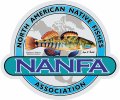Captive Care Notes: Flame Chub (Hemitremia, Family Cyprinidae)
If it were not for its increasing rarity, the Flame Chub (Hemitremia flammea) would be a lovely aquarium fish; it's peaceful, fairly easy to keep and raise, and retains its attractive colors year-round. As a spring fish, flame chub prefer cooler temperatures between 18-23C (65-73F), and a pH of 7.8-8.0. To spawn, place at least three males and three females in a 40-gallon aquarium with fine grain gravel (<11.3 mm). Place a plastic tray (30.5 x 40.6 x 7.6 cm) [12 x 16 x 3 in] lined with the same gravel over one part of the substrate to facilitate harvesting of eggs. To induce spawning, create an artificial "winter" by lowering the temperature to 7.2C (45F) with 6-8 hours of fluorescent light per day. Over the course of 6-7 weeks, gradually increase the light to 16 hours per day, while increasing the water temperature to 18.3C (65F). Condition the chubs with heavy feedings of frozen bloodworms, freeze-dried daphnia, live glassworms, and a flake food containing a vegetable base. When the females get heavy with eggs and the males display minute breeding tubercles and their most brilliant red, watch for spawning behavior to commence. Remove the plastic tray to a hatching aquarium, where the eggs will hatch 3-4 days later at 20C (68F). In another 3-4 days the fry will begin accepting newly hatched brine shrimp. Keep an eye on the adults, as they may spawn once or twice more.
Important note: Flame Chub are protected in Tennessee and Georgia and may not be collected without a special permit. Flame Chub are legally collected in Alabama, but even here the responsible native fish enthusiast will exercise restraint and good sense. As noted below, Flame Chub habitat is fragile and disappearing, and flame chub populations are low. Any careless or overzealous removal of Flame Chub from the wild could have a negative impact on the species as a whole. Please do not collect flame chub unless you are serious about propagating them in captivity.
